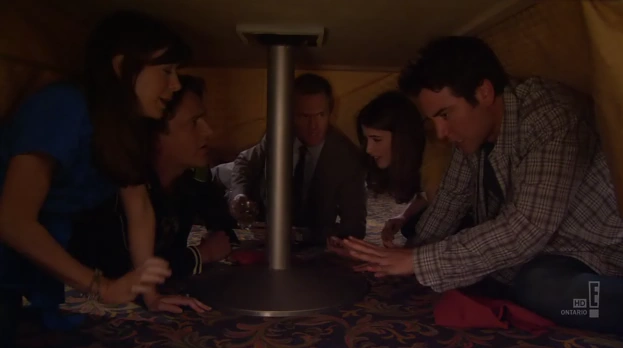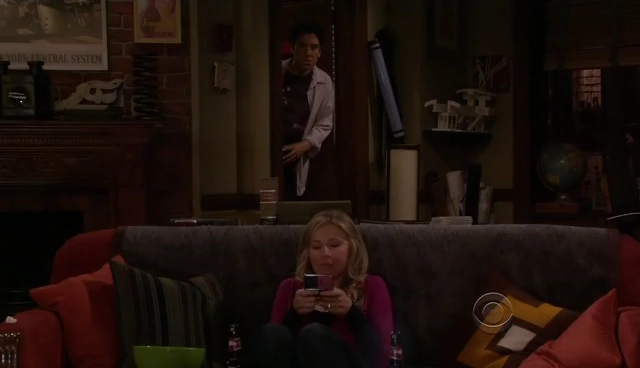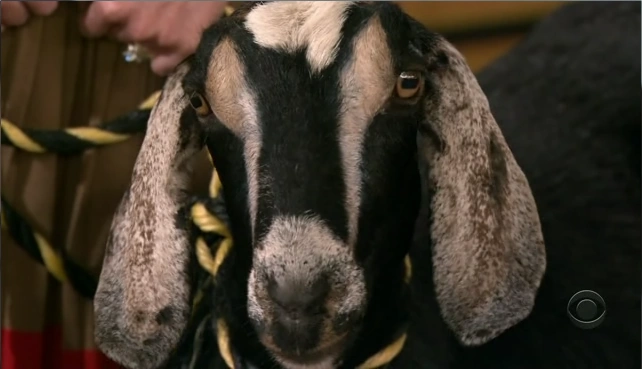Directed by Pam Fryman
Written by Jamie Rhonheimer
One Paragraph Synopsis: After Stella left him at the altar, Ted seems to be taking it pretty well. Or not really, since he seems to be taking it TOO well. In fact, Ted has chosen to not blow off steam, instead maintaining a relaxed state. It turns out that Ted has made a map of places in Manhattan that he'll be likely to run into Stella, in hopes of avoiding her, which the gang uses to find a place to have dinner at. Lily chooses a tapas place that she got a recommendation for... from Stella, who arrives that night. When Ted has the gang hide under the table to avoid her, they share stories people that each would personally do the same for, which has Ted end up deciding to track Stella down and tell her how he feels, especially after finding out that she and Lucy moved downtown for Tony. As Ted goes up to tell her off, he sees how happy the family is, and Ted decides to leave it at that.
One of my favorite things about Robin is her penchant for making bad jokes, and laughing at them to compensate. It's very adorable, and helps her to keep a dorky exterior inbetween everything else. Smulders always gets the laugh down right, while the rest do a good job at maintain their unimpressed faces without coming off as too mean.
Even though this is Ted's episode (and his material is definitely good, as I'll get to soon), I feel like Robin is this episode's underdog. Her flashback is the most pertinent after all, as Robin's description of her relationship is a great indicator of just what Robin, Sr. is like. Robin has mentioned before that her father wanted a boy, but this episode helps to explore this, as we get a glimpse of him.
Eric Braeden (of The Young and the Restless and Titanic fame, and sadly won't reprise the role for much longer) succeeds at keeping a cold demeanor, as he maintains his own serious face, but isn't so far removed from the show's structure as to not have a little fun with his material. Robin Sr. doesn't get many jokes, but he is allowed for nice delivery as he plays a stereotypical man's man. What makes this characteristic work is how it collides with Robin, who is clearly not a man, but in all of her flashbacks does her best to be what her dad wants, despite clearly not being too fond of it.
It is similarly cliched to have a female character's fate questioned by a romantic moment with a guy, but this also isn't a bad idea, as Robin was of the right age to allow her hormones to get the best of her. She doesn't do anything wrong at all, as opposed to her father's continued repressing of Robin's femininity. Even though she's no longer a teenager and never went very far with the guy (her take on moves as compared to hockey statistics is an understated highlight), it's clear that this is more than just a father not wanting his daughter to hook up with her teammate. It really does seem as if Robin, Sr. wants his junior to not blossom or address her girlhood, which is something Robin had to do herself in the decade+ since, with no support from her father. Damn.
Of course, Lily and Barney's stories are also cute, if less emotionally important. Lily's makes sense for her age, or in general, because let's face it, ripping one in public is pretty embarrassing no matter how old you are. Lily has done some less-than-great stuff, but she does find remorse in giving Gasser his name, which is at least a good call on her part.
Meanwhile, Barney's typically gross, not for his conjugal visits, but for his callous response to the incarcerated woman's disgust. He's definitely in the wrong here, just as she has a right to be angry, but at least the scene has its moments. Some sexism aside, primarily the way the fight between her and the other inmate is shot. While there was also a fight about to brew between Robin and Lily in "Intervention", that was in a different context, where it comes off as funnier. Here, there's an almost erotic response in the direction, not helped by Barney's gaze.
As for Ted, on the one hand, I do agree with his friends. It's best to embrace your emotions. Talk about what's wrong, and don't be afraid to confide in whoever hurt you. This isn't weak, but rather a sign of maturity. When you're hurting as obviously as Ted is, this is the best way to help let go of the pain.
But I do give Ted credit for trying his best to not show how saddened he is. Ted has every right to be sad, or mad, or bitter about Stella's decision, but it takes some kind of commitment to not show it to even your closest friends. It makes for some interesting character insight, but he almost contradicts everything by hiding away from Stella. Choosing to not show your grief off is one thing, but complete isolation so rarely works. Sorry, Ted.
Ted's character arc is strong in this episode, as he goes from one verse of "Let It Go" to the next, although I do believe everyone already knew how he was feeling. Still, his brief expressions of anger are almost cathartic, considering how long Ted has been holding it in, contrasting well with his lame approach to hiding everything earlier on.
This flash of anger is exemplified during his taxi drive to wherever Stella is going, right after finding out that she moved in with Tony. One of the biggest fights Ted and Stella ever got into was her unwillingness to move into the city with him, something Tony seemed to get her to agree with no problem. Now that's cold.
Or maybe not. Radnor's reaction to the scene of Stella, Tony, and Lucy happily embracing as she returns with tapas is wonderful, showing his honest regret of the moment. I mentioned in the last review that this isn't Ted's love story, and it really isn't. He was the nice guy who wasn't Mr. Right that you'd find in any given screwball comedy, and played the role well. Well enough to deserve his own Katharine Hepburn or Rosalind Russell. I'm sure she'll come soon, but this is a good way to end a solid to great episode. I only wish that I had the time and energy to write more, but we're still on a roll this season.









